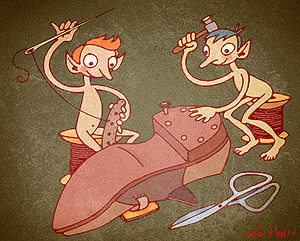I'm still thinking about that Time op-ed that objects to gene editing because, in so many words, if my parents had used it, my brother wouldn't have existed. I went along with this assumption about existence in my last post on the subject, but only for the sake of argument. It's actually quite debatable.
Suppose parents do want to avoid having a child with a gene for a serious disease, like the serious heart defect that was eliminated by researchers. They can already do this, as long as both parents aren't carriers for the gene, by using PGD—pre-implantation genetic diagnosis. Using IVF, multiple embryos can be generated and five-day-old embryos can be biopsied. An embryo without the gene could be implanted and the rest discarded. If people used this method, it's certainly true that certain possible people wouldn't be born. Looking at an actual little brother (Harry, let's say) with a heart defect, it's true to say if my parents had used PGD, Harry wouldn't have existed. The embryo that led to Harry would have been discarded. Larry, not Harry, would have been born.
It's much less clear that this is true, if gene editing is used. Using gene editing, the embryo carrying the faulty gene is allowed to develop, but the gene is edited out of it on day one, at the zygote stage. Would Harry have existed if one of 20,000 genes had been eliminated from the same embryo—the one that actually led to Harry? I think it's true that if an embryo is radically edited, it will lead to a different child being born. But minor editing? Is our entire genome essential to us, so we can't exist if even one gene is edited out?
We're not used to thinking about this, since an individual's genes have always seemed unalterable. It seems to me that we could easily get used to the idea that the same person could have existed with somewhat different genes, and the idea wouldn't be incoherent. If I had the serious heart defect the researchers focussed on, and my parents had been offered the option of gene editing, and had been able to afford it, I can imagine wishing they had created me without the heart defect. That doesn't sound like a metaphysical impossibility.
If that's the right way of thinking about things, the Time magazine author really has things all wrong. PGD, which is already available, is the technology that could potentially have made the author's little brother not exist. But that horse is already out of the barn. CRISPR-cas9 would have given his parents the option of having his little brother, but protecting him or her from the disease he was born with.
If that's the right way to look at it—the same people can be born, despite gene-editing—then gene editing starts to look not just permissible in certain cases, but possibly even obligatory. Suppose you knew your child might be born with a serious heart-defect, and you also knew you could check in advance whether he or she had the relevant gene, and you could eliminate it. Certainly if there was a drug that would fix the heart defect, and you could take it during pregnancy, it would be fair to say you should take it. It's really not clear why gene editing is different.
OK--there are a bunch of other puzzles here, having to do with who winds up being born, if either PGD or gene editing is used, but I'll save that for another day.




















